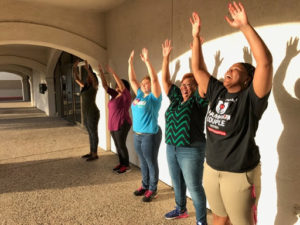New CDC article weighs importance of BMI in African American women’s health assessment
June 30, 2017 • Uncategorized
 |
 |
 |
A new CDC journal article questions the common use of BMI, or Body Mass Index, as a measurement of health for African American women, suggesting instead a more holistic, multifaceted approach to preventing chronic disease and motivating healthy behaviors.
Authors of the article “Beyond Body Mass Index: Are Weight-Loss Programs the Best Way to Improve the Health of African American Women?” published in Preventing Chronic Disease: Public Health Research, Practice and Policy, June 2017, are public health doctoral student Leilani Dodgen, MPH, CHES, and Emily Spence-Almaguer, PhD, Associate Professor and Associate Dean for Community Engagement and Health Equity, at the University of North Texas Health Science Center School of Public Health.
African American women have a higher prevalence (82%) of being overweight and obese than white women (63.2%) or Hispanic women (77.2%), and the rates of chronic disease, disability and premature death among African American women run disproportionately high.
 When compared with white women in the same weight-loss programs, African American women lose less weight and maintain weight loss for a shorter time.
When compared with white women in the same weight-loss programs, African American women lose less weight and maintain weight loss for a shorter time.
Culturally appropriate interventions and motivational themes designed for African American women over the last 20 years have failed to yield significant or sustainable weight loss results.
To address these issues and find solutions, the authors and their team engaged North Texas women in community-based participatory research, gathering data and cooperatively developing a culturally diverse wellness pilot called “SHE Tribe.”
This social network-based healthy lifestyle intervention, which stands for “She’s Healthy and Empowered,” was developed through support from the National Institute on Minority Health and the Health Disparities Exploratory Centers of Excellence of the National Institutes of Health.
At SHE Tribe gatherings, women pursue a lifestyle of health by making small changes that empower action for lifelong wellbeing.
Maximizing the strength of women’s social networks, the program provides participants with online assessment tools, facilitated guidance and a wellness score according to five areas of well-being: goals, self-care, physical activity, nutrition and relationships/social support. As participants set individual goals, they also practice healthy behaviors and reflect on their interest and motivation for making changes.
A program goal is to also inspire participants to lead their own SHE Tribes to promote a larger culture of health.
Based on SHE Tribe findings and other research, the authors concluded that African American women may benefit from this broader approach to health that aligns with values of the community, shifting beyond BMI as the main measure of wellness.
“The prevalent use of BMI combined with the U.S. obsession with weight has made BMI a primary choice for indicating chronic disease risk and measuring health,” Dodgen said. “But BMI reduces the complexities of health to one primary indicator and its accompanying solution, weight loss.”
In most programs, African American women are unlikely to transition from a range considered obese (BMI above 30) or overweight (BMI range of 25-29) to a normal range (BMI less than 25). The average African American woman weighs approximately 187 pounds with a BMI of 32.2 and would need to lose almost 20 pounds in order to reach just the top of the overweight threshold.
Most participants don’t lose enough to reach the BMI target for reducing cardiovascular disease and diabetes risk, and when measured at 18-month follow-ups, many of those who do lose weight will regain up to 33 percent over time.
A weakness of BMI, the authors said, is that it fails to account for differences in body composition, fitness levels and nutritional variances that can predict health and longevity. People can be obese but in good health because of diet and even a moderate amount of physical activity. Muscle mass can also be a factor in adjusting a person’s weight-loss goals.
“Research increasingly shows mortality to be more dependent on cardiorespiratory fitness than BMI,” Dr. Spence-Almaguer said. “This is good news for people who have been unsuccessful at weight loss or maintenance. A moderate level of physical activity can improve health regardless of whether a person loses weight.”

Social media